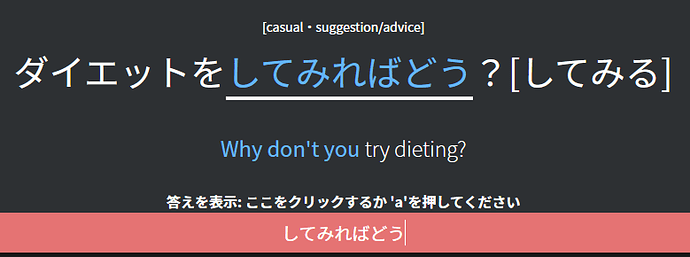Maybe is very obvious but why I can not use してみればどう instead of してみたらどう in this phrase?
I am not really sure, but my Japanese wife says either should be ok.
Thanks for the input.
If both are okay maybe we can get it to be accepted instead of marked as wrong? Or at least warn you to write it other way?
cc @Asher
Right and added bonus is she said that the most naturally casual way would be to drop the どう all together but you know that’s a whole n’other level.
I tried that the first but it was rejected as wrong too 
I have checked this with a few native speakers, and してみたらどう would be natural, but してみればどう (while not incorrect) would not be something native speakers would use, so we will add a warning for it!
As for the reason, think of it like a set phrase in English. As an example ‘The more I run, the fitter I get’, vs ‘The more I run, the more I keep getting fitter’, both are correct, but one will feel like a set phrase to native speakers.
Thanks!
Can we get a warning when you drop the どう too on that grammar point?
I’ve seen in other ones say “We want to check you know the full phrase” but in this one seems like it’s not showing that warning up.
AFAIK -たら can be used in two ways,
-
IF (and after) - THEN
駅へ着いたら電話をします
If, and after, I arrive at the station, I’ll give you a call -
Speculative/impossible scenarios
宝くじを勝ったら何を買いますか?
If you win the lottery (slim to no chance of happening), what will you buy?
ば would indicate there is a possiblity of the outcome to happen, and for good sport, と would indicate that it will 100% happen if conditions are met.
So why is たら more suitable in this case? Well, let’s be honest, you’re still clutching at those macha pocky sticks… odds are not in your favour. 
But on a more serious take, in this case, maybe it’s more of a rethorical question/suggestion, placing it more firmly in the hypothetical world of たら.

